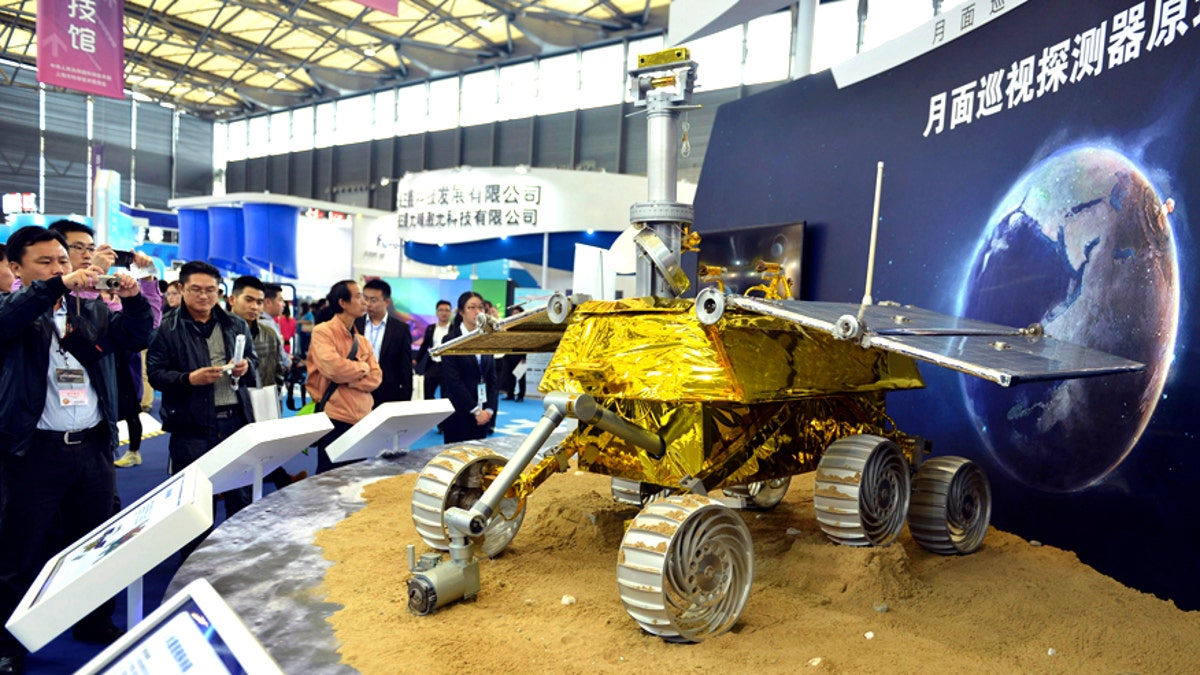
Visitors take pictures of a prototype model of a lunar rover at the 15th China International Industry Fair in Shanghai, November 5, 2013. China will land its first probe on the moon in early December which will deploy a buggy to explore its surface, an official said on November 26, marking a major milestone in the country's space ambitions. (Reuters)
Part two in an exclusive, five-part series exploring how America could once again put men on the moon.
The telephone. The light bulb. The automobile, airplane, commercial airliner and television. Interstate highways, modern weapon systems, computers. The cellphone.
The U.S. has led in major technological advances in the 19th and 20th centuries, inventing, enhancing or perfecting many small steps and giant leaps. So why shouldn’t we continue to lead in space exploration -- including establishing a permanent human presence beyond our Earth?
Special Series: Return to the moon
Monday: It’s time to return
It would be truly amazing, and a huge milestone in human history.
Tuesday: China’s moon rover a wake-up call
Why shouldn’t the U.S. continue to lead in space exploration?
Wednesday: Return to the moon in four years
What if I told you there was an easy way to get Americans back on the moon?
Thursday: How America can lead the world back
China can choose either to compete or join us.
Friday: Why now is the time for a moon base
The U.S. must lead the world in allowing humans to break the bonds that hold us to our Earth.
Recently, China landed an unmanned rover on the moon, although the country appears to have lost contact with the vehicle and the outcome is hazy. I applaud any country that wants to explore space and further our understanding of our solar system. China has come a long way since the Mao Zedong era. It has embraced capitalism -- though it still needs to embrace democracy and increase individual freedom.
But I don’t want to cede the moon to China.
- It’s time to return to the moon, former NASA division chief says
- Very close encounter: Enormous asteroid to zip between Earth and moon Wednesday
- SpaceX to launch amazing rocket that lands itself on legs
- Tempers flare on Capitol Hill as Elon Musk fights for US space bucks
- Where are the moon walkers now?
- Top 10 Moon Crashes
American achievements have made our lives better and safer and have helped to strengthen our children’s advancements in technological excellence. Americans are the greatest competitors in history. We want to be first -- we don’t like to lose. And, I contend, we and the world’s populations are better for it. Put simply, we make the rest of the world rise to our level if they want to compete.
Without our leadership, China’s ambitious moon initiative may establish it as the “go-to” nation for space exploration. Many nations of the world privately say they want the moon to be the next step in space exploration -- but they can’t get there on their own. They need a technically savvy and resourceful country to lead. China and the U.S. are likely the only nations on earth that can do so. Russia seems to have lost its passion for human space flight; to my knowledge, the country hasn't designed any major new human spacecraft hardware in over a decade.
If the U.S. is unwilling to step into the leadership role, these nations will turn to China.
But what is China’s objective for its moon missions? What is its vision? Is it only for national pride? Do the Chinese want to establish themselves as the world’s leader in space? Do they plan to bring in other nations? Some reports have even suggested their intentions are to militarize the moon.
If such a thing were possible, could U.S. missiles protect the country with a three- or four-day notice of a missile strike off the moon, which would mean a far higher velocity attack than missiles launched from Earth -- with no initial heat signature to launch an intercept missile at?
Today, Congress has directed NASA to develop the Apollo-like Orion capsule and to work on a heavy lift launch system, both worthy goals and elements critical to a return to the moon. NASA also is working on test vehicles such as Johnson Space Center’s Morpheus, which are training the future space engineers needed for a Lunar Lander design and developing autonomous landing technology to land safely on the Moon’s surface. But even with all these projects, NASA and the U.S. are focused on asteroid missions that will take decades to achieve limited return. The Chinese challenge should force a reconsideration of near-term objectives in order to maintain our leadership in space exploration.
If we choose not to reach toward the moon, we will lose that position.
